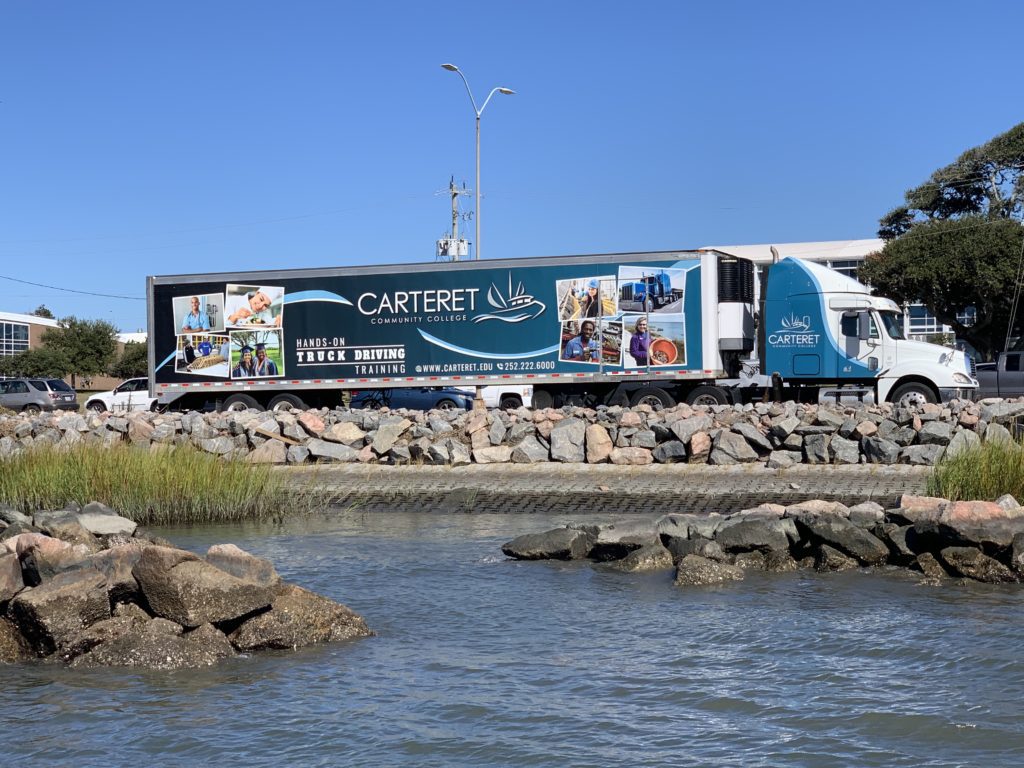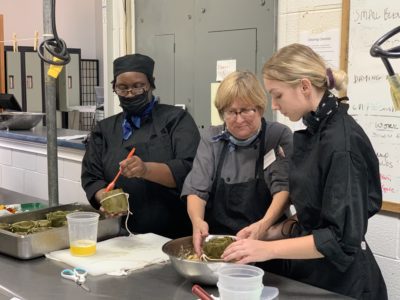

|
|
The COVID-19 pandemic has revealed major gaps in North Carolina’s workforce. Carteret Community College is training students who will work to close those gaps in at least two fields — health science and transportation.
In a study completed late last year, Carteret Community College was found to have an annual economic impact of $56.8 million. For every dollar invested in the college, students gain $6.20 in lifetime earnings, taxpayers gain $1.40 in added tax revenue and public sector savings, and society gains $7.10 in added state revenue and social savings, the report says.
Additionally, one in every 27 jobs in Carteret County is supported by the activities of the community college and its students. Over the past few years, more and more of those jobs have been in nursing and trucking.
Health science
Carteret Community College’s health science program — which includes its nursing degree — has been highlighted as having a particularly significant economic impact for the county.
Laurie Freshwater, dean of health sciences, told EdNC that the associate degree nursing program produced its first graduates in 2007 based on demand for registered nurses (RNs) at local hospitals. Since then, demand has increased.
“And so we are working together on a request to expand our nursing program from 50 [students] to 100 total capacity,” Freshwater said.
According to Freshwater, students getting associate degrees in nursing are typically white women and “they range in age from 18 to 80, it seems like.” Many also have children.
“We always have somebody give birth over the course of the year and come right back the next week and continue their education,” Freshwater said. “It’s your typical community college student facing life and education at the same time.”
Those students come from a variety of backgrounds.
“We usually have a fair number that are military dependents,” Freshwater said. “They come in, they get their RN credential, and then they can go anywhere and work.”
Freshwater said a strength of Carteret Community College’s program is being accredited by the Accreditation Commission for Education Nursing. This enables Carteret’s RNs to work on a military installation with an associate degree, including the nearby MCAS Cherry Point Marine Corps Base in Havelock.
“Normally it would be baccalaureate level nurses that can only be employed on this installation,” Freshwater said.
In addition to students who are military dependents, other nursing students have worked minimum wage jobs and are seeking greater financial security.
“In two years, they can walk out earning a very good salary and benefits to improve their quality of life for themselves and their family,” Freshwater said.
In Freshwater’s experience, that salary typically starts at $45,000 in area hospitals.
For comparison, the U.S. Census Bureau estimates that per capita income in Carteret County is approximately $34,000.


Transportation
In the five years since its inception, the commercial drivers license (CDL) certification at Carteret Community College has continued to grow and expand its own economic impact as part of the college’s transportation program.
According to Perry Harker, vice president of corporate and community education, the CDL certification’s origins are similar to those of the nursing degree.
“We really started the program several years ago based on community input in demand for CDL drivers,” Perry told EdNC.
Unlike in nursing, most students in the CDL program are men and about half are Black. CDL students also tend to skew a little older.
“We get a lot of people that have worked doing something that was kind of hard work, and they realize they’re not going to be able to do that their whole life and driving is a little easier route,” said Rick McCormac, director of workforce training.
When the program began, it relied on facilities and tractor trailers shared by Craven Community College. But that arrangement limited Carteret to offering courses only at night during the fall and spring semesters.
Things changed in 2020.
“In September of 2020, just in time for the fall semester, somebody donated a tractor and trailer to us,” McCormac said. “Then we were able to go from one or two classes a year to running six classes a year, day and night, spring, summer, and fall.”
Today the program has three tractors and two trailers they use for training students. These resources are helping the program meet the high demand for commercial drivers.
According to McCormac, demand is so high that “[students] are pretty much interviewing the companies instead of vice versa.”
And those companies are willing to pay.
“You would have individuals who were working without benefits, working minimum wage,” Harker said, and immediately after completing training, “they’d leave out for a $50,000-a-year job.”
McCormac said some drivers may earn as much as $85,000 if they have a clean criminal background check and a clean driving record, and are willing to take jobs that require interstate travel.
“But by the same token, people come through the class on probation with ankle bracelets on, and there are second chance companies out there that will come and recruit and give you a start,” McCormac said. “If you can get a year or two under your belt with good driving and no incidents, then [you] can go for the upper tier jobs too.”
Impact of COVID-19
In both transportation and health science, the COVID-19 pandemic revealed the impact of staffing shortages that predated the crisis.
“Even prior to COVID, with all the Baby Boomers retiring, there was a huge shortage in the trucking industry anyway,” McCormac said. “And [COVID] just made it worse.”
Freshwater described local hospitals spending millions of dollars to pay travel nurses to fill the gaps exacerbated by the pandemic. The staffing shortages have also prompted hospitals to offer signing bonuses to RNs graduating from Carteret Community College.
“We have hospitals around here where they’re being offered ten to fifteen thousand dollar signing bonuses,” Freshwater said.
Maggie Brown, Vice President of Instruction & Student Support, explained why both nursing and trucking are so crucial to Carteret County.
Brown pointed to the county’s reputation as a destination for hospitality, tourism, and retirement. Both hospitality and tourism rely on a functioning supply chain, while retirees require access to health care.
“So the fact that these two programs combined are those critical infrastructure pieces of having thriving hospitality and tourism, and having thriving healthcare,” Brown said, “it draws people to this area to take advantage of those services”.
Carteret Community College is doing its part to ensure its students are part of that thriving economy.
“[CDL] is one of the few programs I’ve seen, like nursing too, where all you have to do is complete the class and you’ll get a job,” McCormac said.





